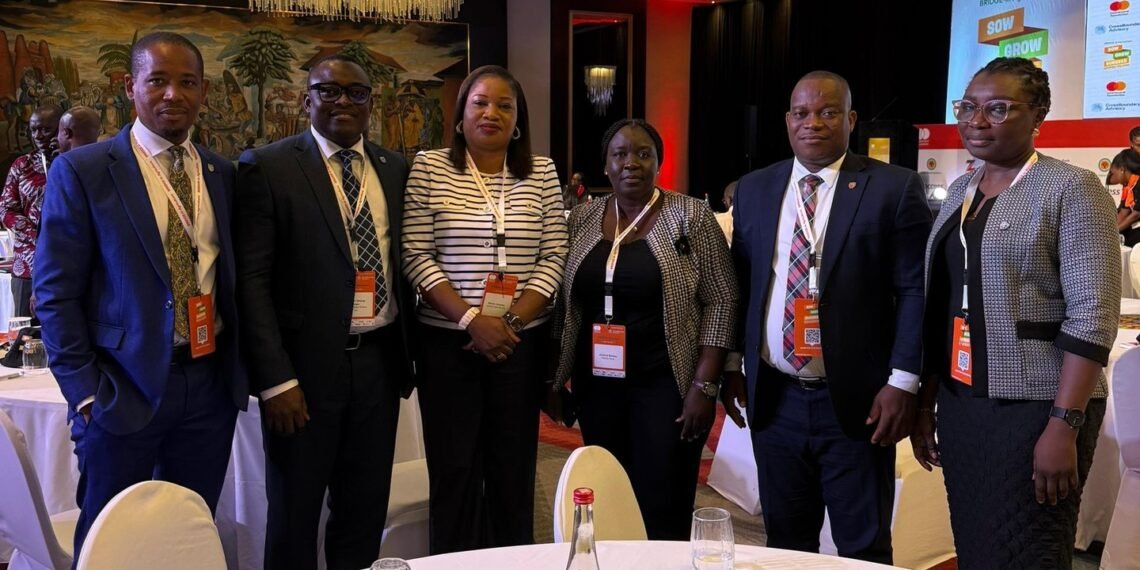Stanbic Bank Ghana has officially joined forces with the Mastercard Foundation and CrossBoundary Advisory under the BRIDGE-in Agriculture Programme — a transformative initiative aimed at revitalizing Ghana’s agricultural sector through inclusive and sustainable support for agri-based small and medium enterprises (SMEs).
The partnership is poised to deliver affordable financing, technical expertise, and capacity building to entrepreneurs, with a special focus on young women and persons with disabilities across the agricultural value chain.
Speaking at the social launch of the BRIDGE-in Agriculture initiative, Marian Amartey, Head of Business Enablement for Business and Commercial Banking at Stanbic Bank Ghana, underscored the bank’s deep-rooted commitment to empowering underserved communities. “This partnership aligns strongly with our belief that Africa is our home, and we drive her growth,” she stated.
According to Amartey, Stanbic Bank’s involvement in the initiative goes beyond a typical collaboration; it represents a strategic move to embed inclusion and innovation in its business model.
“Our role in this partnership is threefold: facilitating access to affordable credit, offering advisory and technical support, and delivering capacity-building initiatives that empower youth and women.”
Marian Amartey
Addressing Long-standing Barriers in Agribusiness Financing
Agribusinesses in Ghana have long struggled with high-interest rates, limited access to tailored financing, and capacity constraints. The BRIDGE-in Agriculture Programme aims to address these systemic issues by working with commercial banks like Stanbic to offer loans at single-digit interest rates. This move drastically reduces the cost of borrowing and provides SMEs with the breathing space to invest, expand, and hire more labor.
Amartey further explained that the partnership compels Stanbic to “think outside the box” and innovate around the bank’s products and services.
“The true potential of agribusiness can only be realized when access to finance is coupled with skills development and market linkage support. This initiative challenges us to move beyond traditional banking models and be more solution-driven in addressing the needs of underserved communities.”
Marian Amartey
Stanbic Bank’s Head of Agribusiness, Samuel Okang-Boye, reaffirmed the bank’s commitment to supporting women and youth-led enterprises. He highlighted that the bank will offer loans with a maximum interest rate of 7% under the programme. However, the initiative extends beyond access to capital.
“This initiative is not just about providing loans — it’s about transforming agribusinesses,” Okang-Boye noted. “We are also providing business development support, access to markets, and technical training to help entrepreneurs scale sustainably. That’s the real value of this partnership.”
He called on young people, particularly women between the ages of 18 and 35, to take advantage of this opportunity and consider Stanbic Bank as a strategic growth partner in their agribusiness journey.
A Scalable, Inclusive Approach to Agricultural Transformation
The BRIDGE-in Agriculture Programme, spearheaded by the Mastercard Foundation and delivered by a consortium led by CrossBoundary Advisory, is designed to make agribusiness a viable and attractive livelihood option for young people in Ghana. By collaborating with commercial banks, the initiative ensures its financial interventions are not only impactful but also scalable and sustainable.
Furthermore, the programme prioritizes marginalized groups, notably women and persons with disabilities, by offering tailored support that meets their specific challenges in the agricultural space. The initiative is projected to directly support hundreds of SMEs and indirectly impact thousands of livelihoods nationwide.
Through this partnership, Stanbic Bank is once again demonstrating leadership in promoting inclusive economic development. The bank’s involvement in BRIDGE-in Agriculture marks a pivotal step in repositioning Ghana’s agricultural sector as a driver of sustainable, equitable, and youth-led growth.
READ ALSO: Ghana Risks Economic Fragility Without Structural Transformation– Prof. Bokpin Warns



















